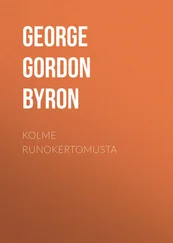George Gordon Byron - The Works of Lord Byron, Vol. 7. Poetry
Здесь есть возможность читать онлайн «George Gordon Byron - The Works of Lord Byron, Vol. 7. Poetry» — ознакомительный отрывок электронной книги совершенно бесплатно, а после прочтения отрывка купить полную версию. В некоторых случаях можно слушать аудио, скачать через торрент в формате fb2 и присутствует краткое содержание. ISBN: , Жанр: foreign_antique, foreign_prose, foreign_poetry, на английском языке. Описание произведения, (предисловие) а так же отзывы посетителей доступны на портале библиотеки ЛибКат.
- Название:The Works of Lord Byron, Vol. 7. Poetry
- Автор:
- Жанр:
- Год:неизвестен
- ISBN:http://www.gutenberg.org/ebooks/27577
- Рейтинг книги:5 / 5. Голосов: 1
-
Избранное:Добавить в избранное
- Отзывы:
-
Ваша оценка:
- 100
- 1
- 2
- 3
- 4
- 5
The Works of Lord Byron, Vol. 7. Poetry: краткое содержание, описание и аннотация
Предлагаем к чтению аннотацию, описание, краткое содержание или предисловие (зависит от того, что написал сам автор книги «The Works of Lord Byron, Vol. 7. Poetry»). Если вы не нашли необходимую информацию о книге — напишите в комментариях, мы постараемся отыскать её.
The Works of Lord Byron, Vol. 7. Poetry — читать онлайн ознакомительный отрывок
Ниже представлен текст книги, разбитый по страницам. Система сохранения места последней прочитанной страницы, позволяет с удобством читать онлайн бесплатно книгу «The Works of Lord Byron, Vol. 7. Poetry», без необходимости каждый раз заново искать на чём Вы остановились. Поставьте закладку, и сможете в любой момент перейти на страницу, на которой закончили чтение.
Интервал:
Закладка:
" Then, thus, to form Apollo's crown ."
A crown! why, twist it how you will,
Thy chaplet must be foolscap still.
When next you visit Delphi's town,
Enquire amongst your fellow-lodgers,
They'll tell you Phoebus gave his crown,
Some years before your birth, to Rogers.
" Let every other bring his own ."
When coals to Newcastle are carried,
And owls sent to Athens, as wonders,
From his spouse when the Regent's unmarried,
Or Liverpool weeps o'er his blunders;
When Tories and Whigs cease to quarrel,
When Castlereagh's wife has an heir,
Then Rogers shall ask us for laurel,
And thou shalt have plenty to spare.
THE DEVIL'S DRIVE. 35 35 The Devil's Drive. A Sequel to Porson's Devil's Walk. – [MS. H.]
36 36 ["I have lately written a wild, rambling, unfinished rhapsody, called 'The Devil's Drive,' the notion of which I took from Porson's Devil's Walk ." — Journal , December 17, 18, 1813, Letters , 1898, ii. 378. "Though with a good deal of vigour and imagination, it is," says Moore, "for the most part rather clumsily executed, wanting the point and condensation of those clever verses of Coleridge and Southey, which Lord Byron, adopting a notion long prevalent, has attributed to Porson." The Devil's Walk was published in the Morning Post , September 6, 1799. It has been published under Porson's name (1830, ed. H. Montague, illustrated by Cruikshank). (See Poetical Works , 1898, i. 30, note 1.)]
The Devil returned to Hell by two,
And he stayed at home till five;
When he dined on some homicides done in ragoût ,
And a rebel or so in an Irish stew,
And sausages made of a self-slain Jew,
And bethought himself what next to do,
"And," quoth he, "I'll take a drive.
I walked in the morning, I'll ride to-night;
In darkness my children take most delight,10
And I'll see how my favourites thrive.
"And what shall I ride in?" quoth Lucifer, then —
"If I followed my taste, indeed,
I should mount in a waggon of wounded men,
And smile to see them bleed.
But these will be furnished again and again,
And at present my purpose is speed;
To see my manor as much as I may,
And watch that no souls shall be poached away.
"I have a state-coach at Carlton House,20
A chariot in Seymour-place; 37 37 [Lord Yarmouth, nicknamed "Red Herrings," the eldest son of the Regent's elderly favourite, the Marchioness of Hertford (the "Marchesa" of the Twopenny Post-Bag ), lived at No. 7, Seamore Place, Mayfair. Compare Moore's "Epigram: " "'I want the Court Guide,' said my lady, 'to look If the House, Seymour Place, be at 30 or 20,'" etc. — Poetical Works , 1850, p. 165.]
But they're lent to two friends, who make me amends
By driving my favourite pace:
And they handle their reins with such a grace,
I have something for both at the end of the race.
"So now for the earth to take my chance,"
Then up to the earth sprung he;
And making a jump from Moscow to France,
He stepped across the sea,
And rested his hoof on a turnpike road,30
No very great way from a Bishop's abode. 38 38 [The allusion may be to a case which was before the courts, the Attorney-General v . William Carver and Brownlow Bishop of Winchester (see Morning Chronicle , November 17, 1813). Carver held certain premises under the Bishop of Winchester, at the entrance of Portsmouth Harbour, which obstructed the efflux and reflux of the tide. "The fact," said Mr. Serjeant Lens, in opening the case for the Crown, "was of great magnitude to the entire nation, since it effected the security, and even the existence of one of the principal harbours of Great Britain."]
But first as he flew, I forgot to say,
That he hovered a moment upon his way,
To look upon Leipsic plain;
And so sweet to his eye was its sulphury glare,
And so soft to his ear was the cry of despair,
That he perched on a mountain of slain;
And he gazed with delight from its growing height,
Nor often on earth had he seen such a sight,
Nor his work done half as well:40
For the field ran so red with the blood of the dead,
That it blushed like the waves of Hell!
Then loudly, and wildly, and long laughed he:
"Methinks they have little need here of me !"
Long he looked down on the hosts of each clime,
While the warriors hand to hand were —
Gaul – Austrian and Muscovite heroes sublime,
And – (Muse of Fitzgerald arise with a rhyme!)
A quantity of Landwehr ! 39 39 [The Russian and Austrian troops at the battle of Leipsic, October 16, 1813, were, for the most part, veterans, while the Prussian contingent included a large body of militia.]
Gladness was there,50
For the men of all might and the monarchs of earth,
There met for the wolf and the worm to make mirth,
And a feast for the fowls of the Air!
But he turned aside and looked from the ridge
Of hills along the river,
And the best thing he saw was a broken bridge, 40 40 [For the incident of the "broken bridge" Byron was indebted to the pages of the Morning Chronicle of November 8, 1813, "Paris Papers, October 30" — "The Emperor had ordered the engineers to form fougades under the grand bridge which is between Leipsic and Lindenau, in order to blow it up at the latest moment, and thus to retard the march of the enemy and give time to our baggage to file off. General Dulauloy had entrusted the operation to Colonel Montford. The Colonel, instead of remaining on the spot to direct it, and to give the signal, ordered a corporal and four sappers to blow up the bridge the instant the enemy should appear. The corporal, an ignorant fellow, and ill comprehending the nature of the duty with which he was charged, upon hearing the first shot discharged from the ramparts of the city, set fire to the fougades and blew up the bridge. A part of the army was still on the other side, with a park of 80 pieces of artillery and some hundreds of waggons. The advance of this part of the army, who were approaching the bridge, seeing it blow up, conceived it was in the power of the enemy. A cry of dismay spread from rank to rank. 'The enemy are close upon our rear, and the bridges are destroyed!' The unfortunate soldiers dispersed, and endeavoured to effect their escape as well as they could. The Duke of Tarentum swam across the river. Prince Poniatowsky, mounted on a spirited horse, darted into the water and appeared no more. The Emperor was not informed of this disaster until it was too late to remedy it… Colonel Montfort and the corporal of the sappers have been handed over to a court- martial."]
Which a Corporal chose to shiver;
Though an Emperor's taste was displeased with his haste,
The Devil he thought it clever;
And he laughed again in a lighter strain,60
O'er the torrent swoln and rainy,
When he saw "on a fiery steed" Prince Pon,
In taking care of Number One —
Get drowned with a great many !
But the softest note that soothed his ear
Was the sound of a widow sighing;
And the sweetest sight was the icy tear,
Which Horror froze in the blue eye clear
Of a maid by her lover lying —
As round her fell her long fair hair,70
And she looked to Heaven with that frenzied air
Which seemed to ask if a God were there!
And stretched by the wall of a ruined hut,
With its hollow cheek, and eyes half shut,
A child of Famine dying:
And the carnage begun , when resistance is done,
And the fall of the vainly flying!
Интервал:
Закладка:
Похожие книги на «The Works of Lord Byron, Vol. 7. Poetry»
Представляем Вашему вниманию похожие книги на «The Works of Lord Byron, Vol. 7. Poetry» списком для выбора. Мы отобрали схожую по названию и смыслу литературу в надежде предоставить читателям больше вариантов отыскать новые, интересные, ещё непрочитанные произведения.
Обсуждение, отзывы о книге «The Works of Lord Byron, Vol. 7. Poetry» и просто собственные мнения читателей. Оставьте ваши комментарии, напишите, что Вы думаете о произведении, его смысле или главных героях. Укажите что конкретно понравилось, а что нет, и почему Вы так считаете.












